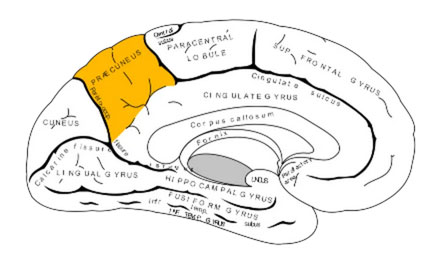|
What Hypnosis Really
Does to Your Brain
Gizmodo, by Esther Inglis-Arkell, 3/08/12

Most people agree that hypnosis does something to your brain —
specifically something that makes people make fools of themselves at
hypnotist shows. But how does it actually affect the human brain? Can it
make people recall events perfectly? Are post-hypnotic suggestions a bunch
of baloney? What is the truth about hypnotism?
A History of Hypnosis
Nearly every culture in the world has a history of hypnotic trances. Some
only considered them spiritual or eerie, but most began to make use of
them as soon as they were discovered. India and China have ancient records
showing hypnotic trances being used to relieve pain during surgery. The
practice migrated to Europe, where in 1794 a young boy having an operation
for a tumor was put under. The boy was Jacob Grimm, who grew up to write
about quite a few hypnotic trances in his and his brother's book of fairy
tales.
As ether and anesthesia came in, hypnosis went out. The medical community
at large rejected its claims to pain reduction and hypnotic suggestions.
Meanwhile, Hollywood embraced it as a plot device, adding on fantastic
properties that made it seem still more outlandish to the public. It
finally settled in the entertainment industry, where it does have the
power to make people do extremely silly things, with extreme sincerity.
(Watching some dead-serious kids give Grammy speeches as if they were
Ricky Martin convinced me that hypnotism must have power over people.) But
the extent of its power has always been debated.
How Hypnosis Affects the Brain
A person in a hypnotic state will appear tuned-out, and one of the marks
of true hypnosis is a decrease in involuntary eye movement to the point
where deeply hypnotized people will have to be reminded to blink. This
gives an observer the impression that the hypnotized aren't paying
attention. In fact, they're playing hyper-attention. Compared to a resting
brain, many areas come online when a person is put into a hypnotic trance.
All the areas that flare to life during hypnosis are also engaged when a
person is concentrating on mental imagery — except one. Like many areas of
the brain, the precuneus lights up during many different tasks, all of
them having to do with a consciousness of self. It also deals with
visuospatial aspects of the brain, letting us know where we are in space.

In essence, when we're hypnotized, people are able to
concentrate intensely on self-created imagery (or imagery that suggested
to them) but do not place their selves as part of that imagery. They've
lost the reminder of what they personally do and what normal judgments
they make, while increasing their ability to think about a whole range of
imaginary situations. This explains the way adults can act out under the
influence of hypnosis, or how they might remain calm and collected in
situations that would otherwise terrify them. But how far does it go?
The Power of Hypnosis
One of the most incredible feats people under hypnosis are supposed to
perform is the ability to remember details of a past event that a person
has consciously forgotten. In movies everyone, under hypnosis, suddenly
has a photographic memory (right up until they try to see the killer's
face). There is debate, and some hypnotherapists claim that they have
helped people retrace their steps through hypnosis and remember locations
of, say, lost items or valuable papers.
But a larger study at Ohio State University cast doubt on whether hypnosis
can actually enhance your memory to such an extent. When two groups of
students, one hypnotized and one only relaxed, were asked about the dates
of certain historical events, the groups performed equally well. The only
difference was, when they were informed that there were some errors in
their answers, the hypnotized group changed fewer answers than the
unhypnotized group. Hypnosis got a more infamous reputation when it was
used by psychologists to 'recover' lost memories, often of childhood
abuse, that never happened.

But hypnosis does have the power to tap into memory in ways that other
techniques do not. Most importantly, it has the ability to induce
temporary, reversible amnesia. This condition is extremely rare, as many
amnesiacs don't recover their memories, and some unlucky ones can't make
new memories.
Although not all hypnotized patients can have their memories suppressed,
and no one suppresses their memories unless they're told to, the effects
can be startling. For one thing, the entire memory can be brought back
with a word. This indicates that hypnosis doesn't obliterate memories, it
just temporarily shuts off the retrieval system. One woman was told she
couldn't remember the word 'six,' and so answered 'seven' to mathematical
questions. A man forgot his own name. Any memory could be suppressed.
But the memory didn't go away. A group of students were hypnotized and
told to forget a short film they had just watched. While unable to answer
questions about the film, they had no problem remembering if the film was,
for example, shot on a handheld camera. It was only the content that was
suppressed. This ability to remember and react to the context of a thing
without remembering the thing itself is the post-hypnotic suggestion. It's
a suggested habit that makes sense in context (like reaching for a cell
phone when hearing a ringtone) but not at that moment (if you deliberately
left your cell phone at home). It just doesn't occur to the person to
think of what they're reacting to before they react.

Another amazing hypnotic ability is, supposedly,
suppression of pain. While it makes sense that people might feel less
self-conscious, what with the part of their brain that feels
self-consciousness offline, and that their perception might be altered by
the part of the brain that governs perception, but pain is different. One
of the primary functions of pain is to force someone out of the reverie
they're in and make them pay attention to reality. Pain is the outside
world breaking in.
But scientists studying perception think our experience is shaped far more
by what we expect the stimulus to be than the stimulus itself. There are
ten times as many nerve fibers carrying information down as carrying it
up. Most people will have experienced feeling a shape in their pockets and
being disoriented until they remember that it's a wadded up receipt, at
which point the sensations seem familiar.
More to the point, most people will remember an itching or sting that,
when they see a more serious injury than they expected, will blossom into
pain. A hypnotized person undergoing surgery, for example, may be able to
convince themselves that they're experiencing the discomfort of a bug bite
instead of a scalpel. That, along with a state of enforced relaxation, can
make all the difference.
But the shadiest aspect of hypnotism — what it can make an entranced
person do — is still shrouded in mystery. Most hypnotists take pains to
stress that no one is enslaved when they're in a hypnotized state, and
that they can't be made to do something they don't want to do. Of course,
that is the line they'd take.
Scientists are, understandably, reluctant to give
people the suggestion to murder someone under hypnosis, and test the
results. Perhaps the best test of this isn't science, but history.
Although there have always been legends of people under the direction of
an evil puppet-master committing unspeakable acts against their will,
there have been no actual cases. So don't worry about going to those
hypnotist shows. Just . . . don't sit in the front.
Source:
https://io9.gizmodo.com/what-hypnosis-really-does-to-your-brain-5891504
NOTE: This is a very good piece on the power
of hypnosis, but for the second to last line of this article. HypnosisReality.com has established the history with close to 100
documented cases of hypnosis abuse. This website has made an effort to
reach out to the author of this article, to offer the historical evidence
that has been collected, in the hopes that it will complete her
relatively decent understanding of hypnosis.
Our bet is, she will get the big picture and
understand it all.
|
Links
More posts from Esther Inglis-Arkell
Gizmodo |




